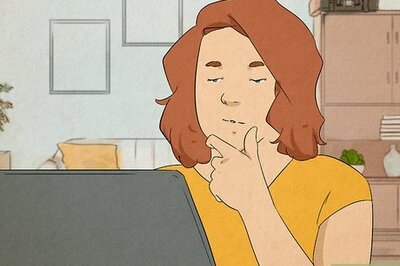
views
Shaheen Bhatt, who has been riding high on the success of her debut novel I've Never Been (Un)happier, has become the new voice of advocacy on mental health issues in India.
The writer recently spoke to News18, about the perils of finding the right therapist and dealing with the news cycle when one is depressed. She also spoke about why children are not immune to mental health issues, and why there should be awareness programs in Indian schools.
Here are the excerpts from the interaction:
During the promotions of your book I've Never Been (Un)happier, you had to revisit many unpleasant episodes of your life that you have mentioned in the book. How have you been coping with this constant reminder of the difficult times?
I think generally it is hard for me to talk about myself at all. It isn't something I'm used to doing but I see myself as a vehicle to spread awareness about mental health. This is just part of it. I'm getting used to it. It is still a bit odd though.
From the questions you get asked, do you get a sense that Indians have a good awareness about mental health issues?
Instinctively, there isn't a person on this planet who doesn't understand mental health issues. For the most parts, we all go through some kind of insecurities, pain and fears at some point in our lives. Unfortunately, we all grow up with a lot of biases, we are told very frequently not to talk about our feelings, we are told not to talk about negative things, and keep them to ourselves. So, there is obviously a general reluctance to talk about it at all.
Also, there is of course misinformation. For instance, sadness and depression are very different things. There is also the misconception that being depressed means you are having a breakdown. People always think of depression as quite an extreme thing. For most parts though, I have had a very surprising response. Most people I had spoken to did have some understanding at the very least about what depression and other mental illness are about.
In your book, you have mentioned that when you finally decided to write this book, there were many naysayers, who did not think it was a good idea to talk about depression publically. But, did you also find friends, and acquaintances, who could relate to your struggle?
An overwhelming thing that has happened over the years is that whenever I have shared my stories about depression, there have been people who have said that they too have experienced similar things. Some have claimed that they had recently come out of depression, while many have said that they are still going through it.
When my father read the book, he said that he too probably had lived with depression his whole life without even realising it. I think, statistically, most people will experience some form of depression at some point in their lives.
Do you think that it is doubly hard for children dealing with some sort of grief to process it, without falling prey to depression?
I genuinely believe that if I had any understanding of depression if I were taught about it in school, or if we had someone who would have spoken to me about it, I would have understood what's happening to me a lot sooner.
I would have understood what I was dealing with when I was 12, rather than when I was 19 and would not have lost out on precious time. I think, all the stigma sort of cement itself over that period of time. Children will benefit greatly if they were taught about mental health at the school level. You have to understand mental health issues from a very young age. In fact, most people, who later suffer from mental health issues, show symptoms at an early age.
How does one differentiate between depression and ordinary sadness?
Sadness is mostly a response to something happening in your life. It is a reaction to some incident. But if you have a persistent unexplained sort of gloom, that's a sign. If it's happening to you consistently and it is happening to you over a period of time, that is a sign.
Sleep disturbances are also a significant indicator. Some people experiencing depression stop sleeping completely, while others sleep too much. Usually, for any kind of sadness that persists for over two weeks, and continues consistently, without any obvious sign of trigger, I would suggest that the person should talk to someone to check it out.
It is already hard for someone suffering from depression to take themselves to the doctor. Sometimes, they have to switch several doctors to find the right therapist. What advice would you give to someone navigating such a situation?
Unfortunately, there is nothing you can really do. If you go into therapy with an understanding that it will take some trial and error, then it really helps. Initially, I didn't realise it. I went in assuming that the first person is going to be the right person and when I found that the person wasn't right, I began to question 'therapy' altogether.
I think it is a lot like becoming friends with somebody. If you meet somebody, your wavelength has to match with that person so that the person can intrinsically understand you. You don't just meet everyone and become best friends with them instantly. It is very similar when it comes to finding the right therapist for you.
How difficult it is for a person dealing with depression to absorb everything that's happening--not just in their lives--but in the world, like the kind of news, or media reports that are always doing rounds?
I think there is a possibility that people who are prone to depression are particularly emotionally sensitive. That's the case with me at least. So, what is going around in the world certainly matters, you are going to be affected. Anyone who has even a shred of empathy will obviously be affected.
If I am having a bad day, I don't watch the news, and I stop imbibing information that is hard for me to process. It is a general thing though, I don't think it is specific for someone who has a mental illness. The world is constantly in some sort of turmoil or another, and if you are someone with empathy, it is going to bother you.
You have also been doing a lot of advocacy work to raise awareness about depression. How has that been going so far?
I have recently started a page called Here Comes The Sun. I launched it in October, this year. At this point, we have started with an online awareness campaign. We wanted to create a platform where people can come and get information about mental health, where people can ask us questions, and we can answer them. We are trying to provide a bridge for people who wants to know more about mental health -- provide helpline numbers, connect them to therapists, and things like that.
It is something I wish to expand over the coming years. We will start doing a lot of on-ground activities too. The goal is to create a positive mental health community.
Follow @News18Lifestyle for more




















Comments
0 comment